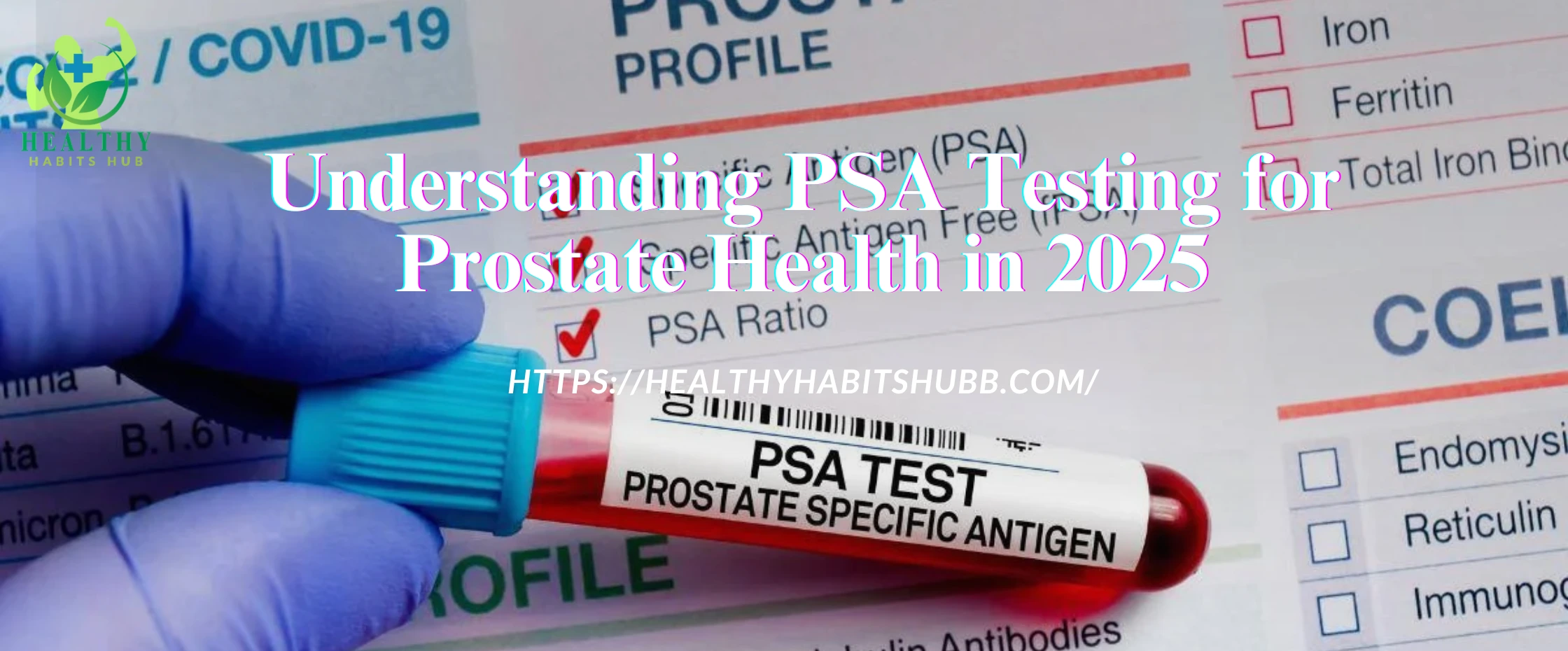What Every Man (and His Family) Needs to Know This Year
🧔🏽🩺🥦💬
Important Disclaimer: This article is for informational purposes only and is not a substitute for professional medical advice. Always consult a doctor or urologist for personalized guidance, especially if you have health concerns or are considering changes to your medical routine.
Talking About the Prostate—Yes, It’s Time
Let’s face it—prostate health isn’t exactly trending on social media. But in 2025, it absolutely deserves more attention. If you’re over 50—or love someone who is—it’s a topic you can’t afford to ignore. One simple test, called the PSA test, might just be the key to early action and peace of mind.
When my uncle casually mentioned his PSA test results over coffee last year, I realized how little I knew about it. That one conversation changed how our whole family looks at men’s health. It wasn’t a dramatic moment—just a quiet wake-up call. Since then, I’ve learned that small steps like routine testing can make a massive difference.
At Healthy Habits Hubb, we’re all about those small, consistent changes that add up to big-time wellness. So, let’s break down PSA testing—not in scary medical terms, but in real language, with relatable stories and doable steps. Whether you’re learning for yourself or for someone you care about, you’re in the right place.
Why PSA Testing Matters for Prostate Health
Table of Contents
ToggleThe prostate is a small gland tucked just under the bladder, but when it goes rogue, it can cause big problems. PSA stands for prostate-specific antigen, a protein produced by the prostate. PSA levels are usually low, but if the prostate is inflamed, enlarged, or cancerous, those numbers can climb.
📊 According to the American Cancer Society, prostate cancer is the second most common cancer among men in the U.S., affecting 1 in 8 during their lifetime.
My uncle’s PSA test caught an issue before symptoms ever showed up. It turned out to be an infection—not cancer—but that early detection meant faster treatment, fewer complications, and a huge sigh of relief.
High PSA doesn’t always mean cancer. But it does mean something’s going on, and catching it early gives you—and your doctor—time to act.
10 Practical Steps to Understand PSA Testing and Protect Your Health
Let’s break it down into manageable actions. You don’t need a medical degree—just curiosity, a willingness to ask questions, and a bit of follow-through.
Learn What PSA Testing Is All About
PSA testing sounds fancy, but it’s just a blood test that checks your PSA levels. I had no idea what it was until my uncle explained it over coffee—he called it his “prostate report card.” Normal PSA levels vary by age, but higher numbers can signal issues like prostate cancer or benign conditions like prostatitis. The Mayo Clinic says most men over 50 should talk to their doctor about testing. Start by asking your doc what PSA means for you. I keep a notebook with health questions for my checkups—it helps me stay on top of things. Knowing the basics empowers you to have informed chats with your doctor.
Talk to Your Doctor About Screening
Not every guy needs a PSA test every year, but it’s worth a convo. My buddy, who’s 55, asked his doc about it during a routine visit, and they decided to start testing because of his family history. The American Urological Association suggests men aged 55–69 discuss PSA screening with their doctor, especially if they have risk factors like African American heritage or a family history of prostate cancer. I jotted down my family’s health history to share with my doc—it made the talk easier. Schedule a visit to weigh the pros and cons, and you’ll feel more in control of your health.
Understand What High PSA Means
A high PSA result can feel scary, but it’s not always bad news. When my uncle’s PSA came back elevated, he panicked, thinking it was cancer. Turns out, it was an infection that cleared up with meds. Harvard Health notes that high PSA can stem from cancer, but also from benign issues like an enlarged prostate or recent activity (like biking). If your PSA is high, don’t spiral—talk to your doctor about next steps, like a biopsy or repeat test. I keep a health journal to track test results—it helps me stay calm and organized. Knowledge is power here.
Know How PSA Monitors Post-Treatment
If you’ve had prostate cancer treatment, like surgery or radiation, PSA testing is your watchdog. My uncle’s doc explained that PSA levels should drop after treatment, and a rise could mean the cancer’s back. Harvard Health says regular PSA tests post-treatment help catch recurrence early, when it’s easier to treat. I started reminding my uncle to log his PSA results after each visit—it’s like a habit we share now. Ask your doctor how often you need testing post-treatment, and keep a record to spot trends. It’s a small step that keeps you proactive.
Adopt a Prostate-Friendly Diet
What you eat can support prostate health. I started adding more veggies—like broccoli and tomatoes—after reading about their benefits. The National Cancer Institute says diets rich in fruits, vegetables, and healthy fats (like nuts) may lower prostate cancer risk. My neighbor swears by his morning smoothie with kale and berries—it’s his prostate power drink. Try swapping one processed meal a week for something plant-based. It’s not about going vegan; it’s about small choices that add up for your health.
Stay Active for Prostate Wellness
Exercise isn’t just for your biceps—it’s good for your prostate too. I started walking 20 minutes a day after work, and it’s cleared my head and boosted my energy. The CDC says regular activity, like walking or swimming, can reduce inflammation and support overall health, which may help your prostate. My cousin joined a local senior fitness class and says it’s more fun than the gym. Aim for 150 minutes of moderate exercise a week—find something you love, and it won’t feel like a chore.
Manage Stress for Better Health
Stress can mess with your body, including your prostate. I was stressing hard last year and noticed I felt off—turns out, it wasn’t helping my health. The Mayo Clinic says chronic stress can weaken immunity, which isn’t great for preventing disease. I started doing five minutes of deep breathing daily, and it’s like a mini vacation. My friend uses a meditation app for quick sessions—says it keeps him grounded. Try a simple stress-buster, like journaling or a walk, to keep your mind and body in check.
Get Regular Checkups
PSA testing is just one piece of the puzzle. Regular doctor visits catch issues early. I make a yearly appointment like it’s a date with my health—it’s saved me from surprises. The American Cancer Society recommends annual checkups for men over 50, including a digital rectal exam alongside PSA testing. My uncle schedules his in January to kick off the year right. Book your next visit and ask about prostate screenings—it’s a habit that keeps you ahead of the game.
Build a Support Network
Talking about prostate health can feel awkward, but having a crew makes it easier. I started chatting with my uncle about his PSA tests, and it’s brought us closer. The CDC says social support improves health outcomes by reducing stress and encouraging checkups. Join a men’s health group or talk to a trusted friend. My local community center has a men’s wellness night that’s surprisingly fun—think beer and health talks. Sharing your journey makes it less daunting and more empowering.
Stay Informed About Prostate Health
Knowledge is your best defense. I was clueless about PSA until I started reading up, and now I feel ready to ask my doc the right questions. The National Cancer Institute offers free resources on prostate health—bookmark their site for easy access. My neighbor attends free health talks at our library, and he’s a walking encyclopedia now. Spend a few minutes a week learning about prostate health—it’s like giving your future self a high-five.
Real-Life PSA Journeys That Inspire
🧑🏫 Tom’s Wake-Up Call
Tom, 58, was inspired by a friend’s cancer diagnosis to ask about PSA testing. His first test showed slightly high levels—but no cancer. Instead, it uncovered a treatable infection. That test prompted him to improve his diet and start walking every evening. Now, he tracks his results like clockwork and feels more in control than ever.
👴 Grandpa Ray’s Lifestyle Makeover
Ray, 72, once shrugged off prostate screenings—until a routine test showed a spike in PSA. Thankfully, it wasn’t cancer, just an enlarged prostate. But the scare pushed him to change. He cut back on red meat, started swimming, and joined a men’s health circle. Today, Ray is healthier, more active, and encourages others to get checked.
Building Prostate Wellness Into Your Life
Don’t overwhelm yourself. Pick one thing: schedule a checkup, swap one meal, take a walk, or talk to your doctor. I keep a sticky note on the fridge with my “health to-dos.” It’s my tiny accountability buddy.
👥 And hey—make it social. My uncle and I now share weekly health wins over text. Sometimes it’s just “ate a salad” or “booked a physical,” but it keeps us going.
FAQs: Your PSA Testing Questions Answered
Got questions about PSA testing? Here’s what our readers are curious about.
When should I start PSA testing?
The American Urological Association suggests men aged 55–69 discuss it with their doctor. If you’ve got risk factors, like family history, start earlier—around 45.
Does a high PSA always mean cancer?
Nope! Infections or an enlarged prostate can raise PSA. My uncle’s high result was just an infection. Your doc can sort it out with more tests.
How often should I get tested?
It depends—yearly for some, less often for others. I ask my doc for a schedule based on my health.
Can lifestyle changes lower PSA?
Possibly! The CDC says a healthy diet and exercise can support prostate health, though they don’t directly lower PSA.
What if I’m nervous about testing?
Totally normal. I was nervous too—talking to a friend helped. Ask your doc to walk you through the process.
Are there community resources for prostate health?
Yes! Check local health fairs or men’s groups. My town’s clinic offers free PSA talks that are super helpful.
When to Call the Doctor
If your PSA is high or you’re having urinary issues, don’t wait. Call your doctor. Keep an emergency contact for a local urologist just in case. Better to be proactive than reactive.
And if symptoms like pain, blood in urine, or difficulty peeing arise, get checked—ASAP.
Community Connection at Healthy Habits Hubb 🧡
Prostate health isn’t just a solo mission—it’s a community effort. Join local wellness events, attend screenings, or drop your story in the comments below. Let’s create a space where men feel empowered to talk health—without shame or fear.
💬 What’s one prostate health habit you’re trying this week? Tell us in the comments!
Final Vibe Check ✅
Prostate health in 2025 is no longer a hush-hush topic. PSA testing is simple, smart, and potentially life-saving. Whether you’re just learning or already on a wellness journey, start small. Ask your doctor. Eat the broccoli. Go for that walk. Share the story.
You’ve got this.
References:
- Harvard Health Publishing. “How is PSA used to monitor prostate cancer?” Available at: https://www.health.harvard.edu/blog/how-is-psa-used-to-monitor-prostate-cancer-202507283103
- American Cancer Society. “Prostate Cancer Early Detection.” Available at: https://www.cancer.org/cancer/prostate-cancer/detection-diagnosis-staging.html
- Mayo Clinic. “Prostate-Specific Antigen (PSA) Test.” Available at: https://www.mayoclinic.org/tests-procedures/psa-test/about/pac-20384731
- National Cancer Institute. “Prostate Cancer Screening.” Available at: https://www.cancer.gov/types/prostate/patient/prostate-screening-pdq





